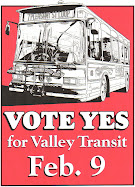Voters show compassion in support for Valley Transit
Supporters of the bus service did a masterful job of explaining to the public why the additional funding was necessary.
Wow! Local voters didn't just embrace the Valley Transit bus system on Tuesday, they gave it a big ol' bear hug. And, in doing so, the people of this Valley showed they are compassionate and caring.
More than 76 percent of voters favored raising the sales tax by three-tenths of one percent, which will give Valley Transit enough money so it can continue to operate without having to make dramatic cuts in service.
It's simply amazing Valley Transit garnered so much support for a tax increase in the midst of a severe economic recession. Times are tough and have been so for a long time.
Six months ago, when the idea of raising taxes was first brought up, we believed it was a mistake. We said, emphatically, voters will not approve raising the sales tax to fill Valley Transit's budget gap.But we were way -- way -- off.
Valley Transit supporters did a masterful job of explaining to the public (and to us) why the additional funding was necessary to keep the bus system healthy. The tone of the campaign was friendly and information it got out was understandable.
It was made clear that Valley Transit's managers and board of directors have been extremely efficient in running the bus system for the past decade.In 1999 voters statewide approved Initiative 695, which did away with the motor vehicle excise tax. As a result, Valley Transit and other transit systems lost half of their operating revenue. Nearly all of the bus systems went to voters in a relatively short time seeking the higher sales tax to fill the gap.
Valley Transit didn't. The budget was cut and spending reduced. The service provided was trimmed to a level that would allow the bus system to serve the community with supplements from state and federal grants. Unfortunately, the recession hit and sales tax revenue dipped significantly. Sales tax collections went down and the likelihood of future federal grants disappeared.
Valley Transit had little choice but to ask voters to double the sales tax. If the voters said no, then bus service would be cut in half.
Well, voters enthusiastically agreed to take on the additional tax burden to keep the bus system running at a level to meet the transportation needs of all. Many in this community don't have cars or can't drive and depend on Valley Transit for their transportation needs.
The overwhelming support, a stunning 76 percent, is a testament to the generosity and compassion of the people of this Valley. 2/10/10
VOTERS SHOULD APPROVE TAX HIKE TO KEEP BUSES ROLLING
Valley Transit simply can’t operate a comprehensive, dependable system without additional sales-tax revenue.
It’s difficult to justify raising the sales tax during the best of economic times. It’s even tougher now given the recession that’s engulfed the nation.
But a very strong case has been made for raising the sales tax by three-tenths of one percent to provide funding for the Valley Transit bus system. These funds are essential for Valley Transit to maintain service at the current level. Having a comprehensive, dependable public transportation service is vital to the community.
Valley Transit is an extraordinarily well-run bus system. It carries 800,000 riders a year or 2,600 passengers a day.
Its manager, Dick Fondahn, and Board of Directors — made up of elected Walla Walla and College Place city council members and Walla Walla County commissioners — have demanded that Valley Transit run efficiently.
That’s why Valley Transit has continued to serve the community for the past decade after half — yes, half — of its funding was eliminated. Voters in 1999 approved Initiative 695, which imposed the flat $30 car tab fee and eliminated the motor vehicle excise tax.
When Valley Transit was started in 1979 it was funded by a three-tenths of a percent sales tax (approved by a vote of the people) and matching funds from the state via the MVET.
When I-695 did away with the MVET match nearly every transit system in the state backfilled those funds by asking voters for more sales tax money. Valley Transit took a different route.
First, the budget was cut and spending reduced. The service provided was trimmed to a level that would allow the bus system to serve the community until another source of revenue could be found. Fondahn, the Valley Transit staff and its board did find additional money by applying for and receiving state and federal grants.
Year after year Valley Transit was able to keep its wheels out of red ink through prudent management and successful grant applications.
Then the recession hit. Sales tax revenue dipped significantly. In addition, the likelihood of future federal grants also disappeared.
So, either Valley Transit must cut its hours of operation in half, which will dramatically curb access to the bus service, or find a sufficient, sustainable funding source. The only viable option for that amount of revenue, about $2 million a year, is a sales tax hike.
Nearly every other transit system in Washington sought an increase in the sales tax rate of that much — or more — over the last decade. Valley Transit officials did everything possible to avoid that action. Now it is unavoidable.
Valley Transit is a critical service to those who can’t drive, can’t afford a car and many others in this Valley. Students count on the system to get to and from schools — and then to their jobs.
Valley Transit is more than a bus line to some, it’s a lifeline.
We strongly urge citizens to support this tax increase to maintain a strong bus system. 1/24/10




